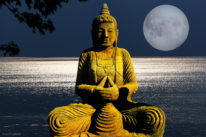
“Knowing others is intelligence; knowing yourself is true wisdom.” ~Lao-tzu
There seems to be a common perception in our culture that knowledge equals wisdom; however, I don’t believe this is true.
I would say that wisdom is what knowledge becomes when we have brought it into our hearts and experienced it as true.
Wisdom cannot be gained by passively accepting what we read or by believing what another person tells us. We must take an idea or thought and test it, truly investigate it, before it can become wisdom.
Wisdom requires awareness and a willingness to ask ourselves—and experience firsthand—what is true for each of us.
We’ve all read a book, or heard someone speak, and learned ideas and theories that sounded really great; but this information cannot be wisdom until it has been tested in our own experiences.
In other words, wisdom comes from walking the walk, not just talking the talk.
According to Buddha, we cannot believe something just because it is written in a book, or because the person who said it is well-known, or a teacher, or an elder. He said to only believe something after you have tested it in your own heart and found it to be true.
He states, “Those who recite many scriptures but fail to practice their teachings are like a cowherd counting another’s cows.”
In my early years as a therapist I felt as though I needed to be the “expert.” I would offer my clients, and friends, and family, and people I barely knew, what I thought were wise phrases hoping to impress and impact them with my “wisdom.”
I thought that I could gain the assurance I was looking for by demonstrating how smart I was, relying purely on my education and the knowledge I had attained from teachers and supervisors.
However, the harder I tried to prove myself, the less confident and effective I felt. I would stumble over my words, trying to recite some theory that would end up just coming out like advice-giving, leaving the other person feeling confused and uncertain.
I thought wisdom meant knowing all the answers all the time. I had been in my own therapy for years and had a high level of insight and awareness of myself; however, I had not yet really begun practicing the principles I was preaching of compassion and self-acceptance. As a result, I felt a bit like a fraud.
What I’ve since realized is that wisdom does not mean “knowing” all of the answers.
Wisdom is a state of mind, specifically, an openness of mind, that has explored and experienced truth. Wisdom requires action.
Wisdom does not have set answers for everything, but instead has a willingness to learn. Rather than trying to resist or hide my not-knowing, I have learned to embrace it with compassion and use it as an opportunity to consider a new way of understanding something.
There is a tremendous amount of freedom that comes when we relieve ourselves of this burden to always have the “right” answer.
If you are struggling with something in your life right now, consider this: There is no one right answer. There is a lot of information out there, and it can be overwhelming at times, especially when you encounter the zealots (which can be me sometimes) who swear that this (fill in the blank) is the solution.
The solution already exists inside of you. The wisdom will be revealed as you begin to experiment with the different ideas and discover what is true for you.
Consider asking yourself, “What feels right for me?” “What do I believe to be true?”
You may find that what feels true for you is not what feels true for important people around you, or even the majority of the people around you, and maybe that’s okay.
Many people tend to think of wisdom as a way to one-up another person, to split the world into “right” and “wrong.” We show very little tolerance for those who have a different belief system and we use harsh judgment to defend our way of doing things. Indignant self-righteousness has become commonplace in our culture.
I think wisdom has very little to do with being right—at least not in the way that puts another person down. So often we fall into the trap of wanting to be right not so that we can help another person but so that we can prove that we are somehow better, or smarter, than them.
I think it is important for us to look at our attitude and energy behind our efforts to be right. Are our words creating more division than harmony? We may be right about certain factual details, but are we right in the way we went about it?
Wisdom is not just about the details but in how something is said. Wisdom requires asking what brings more harmony and integration, and what creates more conflict and division.
From this perspective, no one is really right. Sometimes I have wisdom to offer, and sometimes you do.
Wisdom is a process. It asks us to be both a student and a teacher and it is a community effort.
Photo by Edward Dalmulder
About Jennifer Chrisman
Jennifer Chrisman is a Licensed Clinical Psychologist practicing in Los Angeles, where she specializes in using Mindfulness based approaches to help her clients find more meaning in their life. To learn more, you can check out her website here, or follow her on Facebook or Twitter.













 Though I run this site, it is not mine. It's ours. It's not about me. It's about us. Your stories and your wisdom are just as meaningful as mine.
Though I run this site, it is not mine. It's ours. It's not about me. It's about us. Your stories and your wisdom are just as meaningful as mine. 